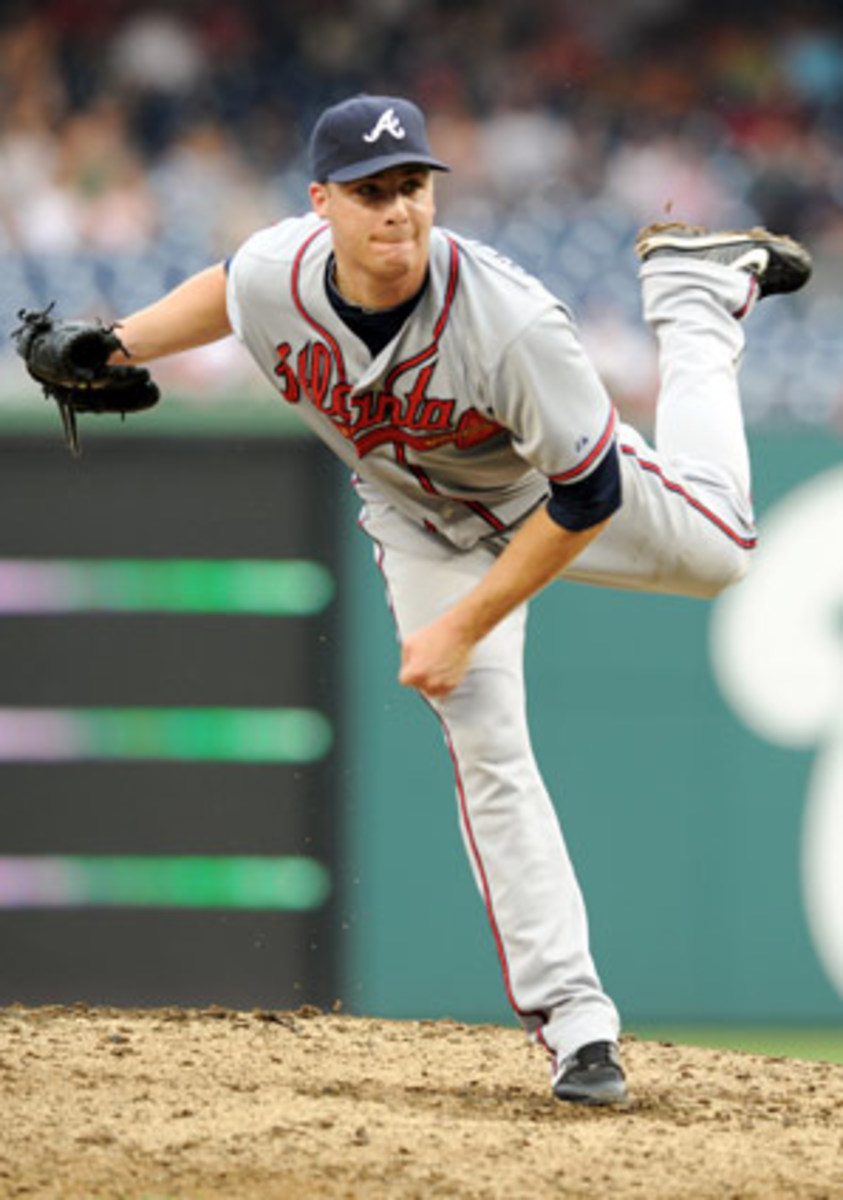Braves' bullpen offers real threat to Philadelphia's World Series bid
You know about Johnny Venters and Craig Kimbrel, the eighth- and ninth-inning options for manager Fredi Gonzalez. They have not been scored on in 39 1/3 combined innings for the past two months and almost never give up home runs. But Eric O'Flaherty has Venters-like stuff, Peter Moylan is working his way back off the DL, Arodys Vizcaino is bringing high-90s heat, and top prospects Randall Delgado, who was sent back to Triple-A after one-hit ball against the Giants, and Julio Teheran, perhaps the top pitching prospect in baseball, all will be available in September and October.
Meanwhile, lefty Mike Minor (six shutout innings against the Giants) and righty Brandon Beachy give Gonzalez options as starters or long relievers. Atlanta's postseason rotation hinges on the health of Tommy Hanson, whose shoulder finally cried "uncle" from his stop-and-go delivery. Hanson could be back from tendinitis in five to 10 days. But the Braves are deep on the mound and, with Michael Bourn and Jose Constanza giving them a speed element, much more dynamic on offense.
Give GM Frank Wren credit. He shopped for Carlos Beltran but balked at giving up any of his Four Horsemen: Minor, Teheran, Vizcaino and Delgado. He wound up with a better fit -- Bourn -- who the Braves also control for next season, without yielding his top prospects.
And give credit to Gonzalez, too. At the All-Star break he and pitching coach Roger McDowell re-assessed how they used O'Flaherty, Venters and Kimbrel. Though the Braves play so many close and extra-inning games, he decided to slightly back off how much he used his top relievers -- not just to keep them fresh for the stretch, but also for the next five or six years. Atlanta, comfortably ahead in the wild card race, will be a dangerous postseason matchup going into the playoffs with a rested bullpen full of strikeout pitchers.
It's a shame to watch the Giants waste the greatness of Tim Lincecum, but their offense is so decimated by injuries and age that San Francisco has become historically awful at supporting its pitchers.
The Giants have scored the fewest runs in the league. No team ever has reached the postseason when scoring the fewest runs, according to the Elias Sports Bureau. The 1973 Mets and the 1985 Royals came closest, finishing with the second fewest runs.
The Giants are scoring just 3.42 runs per game. That would be the second-worst rate in the 129-year history of the franchise, better than only the 1902 outfit (2.87) that hit six home runs smack in the middle of the dead-ball era. None of the seven worst offenses in Giants history came close to a winning record, but somehow these Giants are nine games better than .500 and are actually closer to first place than they were after 125 games last year. Here's where these Giants rank among the worst scoring teams in franchise history:
Minor leaguer Mike Jacobs picked a bad time to get busted for a flunked HGH test. The players' association is negotiating a collective bargaining agreement with the owners, and it considers blood tests for HGH very problematic because of what it believes are the invasiveness and unreliability of such tests.
But the test results from Jacobs (baseball implemented blood testing in the minors, where collective bargaining is not required) -- and on the heels of the NFL players agreeing to blood testing for HGH -- turns up the heat on the union to reconsider its position. Remember, public disclosures forced it to drop its "privacy" concerns about urine testing for steroids.
Negotiations between the union and Major League Baseball have been proceeding without rancor. What makes these negotiations so different from the CBA talks of the NFL and NBA -- and far more fascinating in terms of negotiating strategy -- is that baseball's talks do not hinge on disagreements over dividing revenues.
Instead, the two biggest issues will be some kind of slotting or budget system for the draft and expanding the drug-testing policy. The NFL players, for instance, did not dig in their heels for draft picks. Cam Newton took a 56 percent cut from what Sam Bradford received the previous season.
What will the baseball players do? MLB is serious about trying to change the bonus money paid to draft picks. (All but one of this year's first-round picks, perhaps sensing a change, signed with his drafting club.) The union is serious that any kind of cap -- and it regards a slotting system for draft picks a form of capped pay -- will not fly.
So the union finds itself not in a fight for how its members are paid, but for what high school and college draft picks should be paid and for HGH to continue to go undetectable.





